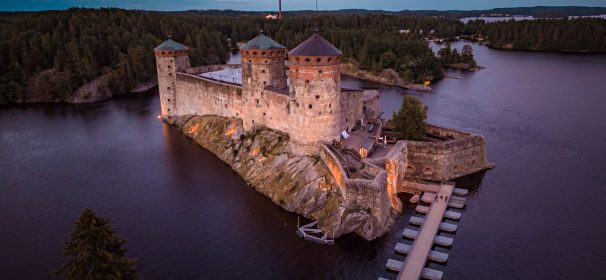Libretto set in Antwerp, first half of the 10th century
Act I: Near Antwerp, a meadow on the banks of the Scheldt
Act II: The fortress at Antwerp
Act III: The bridal chamber – The banks of the Scheldt
ACT I
The legendary King Heinrich (Henry the Fowler), surrounded by Thuringian and Saxon knights, joins up with the Brabantian nobles led by Friedrich von Telramund on the banks of the River Scheldt. The Hungarians are nearing the border again after a long period of peace, and war is imminent. Heinrich urges his armies to band together in order to defeat the enemy. On his deathbed the Duke of Brabant entrusted the care of his children, Gottfried and Elsa, to Telramund. When she comes of age, Elsa is to marry Telramund and Gottfried will be the new Duke.
One day, while Gottfried and Elsa are walking in the forest, Gottfried mysteriously disappears. After that, Elsa is no longer herself and seems to inhabit another world, not reacting to anything around her. Telramund, who has meanwhile married Ortrud, orders Elsa to be tried for the murder or her brother. The King must exercise his jurisdiction, and he urges Elsa to defend herself. She, however, merely trembles and is incapable of defence. Instead she speaks of a dreamlike vision she had of a knight in shining armour.
Telramund hints that Elsa has a secret lover and has tried to get rid of her brother so that she and her lover may rule Brabant unimpeded.
Telramund hints that Elsa has a secret lover and has tried to get rid of her brother so that she and her lover may rule Brabant unimpeded. Appealing to God’s judgment, Telramund challenges any knight who may appear to champion Elsa. Not one steps forward. Her tears and prayers finally bring about a miracle: from afar, in a boat drawn by a mysterious swan, a hero arrives, a nameless knight sent by God to champion her. Before the duel, the hero twice demands that she must never, for any reason, ask about his origins, his name or his family. Telramund, sure that God is on his side, agrees to fight. The stranger defeats him but spares his life and as his reward wins Elsa as his wife.
ACT II
A gloomy, dismal night witnesses the humiliation of Telramund, a valiant man until then so untarnished. His fate has been decided by Ortrud, queen of evil, the faithful priestess of pagan gods who convinced Telramund of Elsa’s guilt. For Ortrud claims to have watched from the castle as Elsa pushed Gottfried into the lake and left him to drown. She now hatches a new devilish plot and convinces Telramund that the duel was dishonest, the strange knight having won only by witchcraft. But he can easily be defeated because his strength is now in the hands of a weak girl, Elsa. If Telramund and Ortrud can persuade Elsa to enquire after the name of her betrothed, the invincible knight will become powerless and as weak as a little child.
Elsa comes out onto the castle balcony and Ortrud begins to implement her treacherous plan. Faking humility and repentance, she manages to convince Elsa and plays on her trust to instil more and more doubt in the mind of the future wife of the mysterious knight. Meanwhile the King has decided to banish Telramund from Brabant along with anyone who consorts with him.
For Ortrud claims to have watched from the castle as Elsa pushed Gottfried into the lake and left him to drown.
A procession of women sets off to accompany Elsa to the altar when all of a sudden Ortrud steps out of the crowd and bars her way. First Ortrud, then Telramund make use of Elsa’s weakness to persuade her that her happiness will be short-lived. For she knows nothing about her champion: not his name, his past, where he comes from, and especially how long he intends to stand by her side, if at all. Elsa proceeds towards the altar but her soul is filled with awful doubt. The hero, now Protector of Brabant, intends to lead the Germanic armies against the threat from the East on the following day and cares not for Telramund’s new accusations. He can, however, do little to bolster the young Elsa’s wavering faith as they reach the top step leading up to the church and Ortrud’s domain. Elsa, now Ortrud’s victim, turns her gaze upon Ortrud standing below, almost as if seeking solace.
ACT III
The famous wedding march has accompanied the bridal couple. Elsa and her hero are now alone together for the first time. Elsa confides that she had already seen her husband in a dream and been eternally enraptured. She has but one torment, however: her lips may never pronounce his sweet name. The knight tries in vain to pacify her. Elsa, in a moment of great emotional turmoil, possibly still under Ortrud’s devilish spell, believes she sees the swan, which has come to take her companion away again. Delirious and unable to find peace, she haplessly begs her husband to disclose his secret.
All is lost. In rushes Telramund with four loyal Brabantian knights intent on killing the hero. Elsa has momentarily revived and hands her husband a sword that, at a single stroke, fells Telramund to the ground. His companions beg for mercy.
She has but one torment, however: her lips may never pronounce his sweet name. The knight tries in vain to pacify her.
Horrified, Elsa stands before the King, in the depths of despair. The knight announces he can no longer lead the men into battle because he has been twice wronged: he has been assaulted, and Elsa, unwittingly, has been involved in a plot hatched by Telramund and Ortrud. She has broken her vow.
The stranger from afar no longer has any secrets. He comes from an enchanted place, Monsalvat, where the most sacred of relics, the Holy Grail, is kept. He keeps guard over it. His father is Parsifal, ruler of the holy lands, and the name Elsa was never to pronounce – and never will – is Lohengrin. Lohengrin predicts that the King will win the battle and the swan arrives from afar to take him away. As Lohengrin draws away, Ortrud reveals her terrible plot: it was she who made Elsa’s brother disappear and turned him into a swan. This same swan is now taking Lohengrin away. On hearing the words, Lohengrin stops, falls to his knees and prays. A dove descends from heaven to draw his boat to Monsalvat. The swan dives into the water and emerges as Gottfried, the new Duke of Brabant. Elsa, in despair and racked by torment, falls dead at her brother’s feet.




